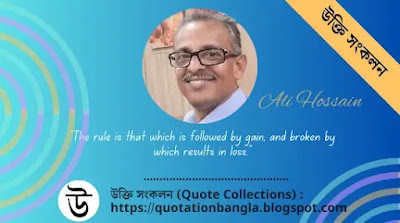Revolutionary Ganesh Ghosh's comments on Religion
Revolutionary Ganesh Ghosh's comments on Religion
 |
| Revolutionary Ganesh Ghosh's comments on Religion |
“Believing in religion is a sign of faint-heartedness, a sign of lack of faith in oneself.”
— Ganesh Ghosh
Read this Quote in Bengali
Know Source and Context of this Quote :
Chittagong Armoury RaidersREMINISCENCES
by KALPANA DUTT
People's Publishing House
BOMBAY
Page: 35
...This is how he spread awakening among the people and helped to build up the organisation outside even when he was in jail.
His revolutionary career started about the same time as Ananta Singh's. But they had quite a large difference in outlook. He was a different type of man as compared to Anantada. He did not care a fot for any superstitions. I recall one incident. They were sending me to Calcutta on urgent work. Even a day's delay was costly. Anantada said "We shall send her off on a Friday, it was the day of the Eastern Uprising' (Ireland). Thursday won't do. We have always been out of luck on that day. You re-member, on a Thursday, in the Kalarpole battle, we lost. four of our boys." Ganeshda would not agree. He said "Not a moment's delay! Friday would be too late. Let her go on Thursday. We shall work hard to make every day of the week our lucky day."
He had amazing self-confidence. He did not believe in fate, in God and religion. He used to say ‘All this is a sign of faint-heartedness, of lack of faith in oneself. Man-finess, single-minded devotion to a cause, self-confidence -these are the things that bring success.’
I had the idea, Masterda would say, 'that Ananta's faith in God accounts for his success. But I find that Ganesh has shown the correctness of his beliefs in his own practical success. Before going to the Ordnance Jail, there was a big difference between Ananta and Ganesh. Ananta's powerful personality and his hard-working capacity would catch the eye more than Ganesh's. But when they both came out of jail after two years I found neither Ananta nor Ganesh was the same any more. They had both changed and blended into one, so to speak!
In his outlook, he differed somewhat from the other revolutionaries of those days. He used to say 'Our supreme aim is not just to mount the gallows and die a brave death. We must live and fight bravely and make our mission suc-cessful. That is why we must do everything possible to fight and live."
Page: 35
...This is how he spread awakening among the people and helped to build up the organisation outside even when he was in jail.
His revolutionary career started about the same time as Ananta Singh's. But they had quite a large difference in outlook. He was a different type of man as compared to Anantada. He did not care a fot for any superstitions. I recall one incident. They were sending me to Calcutta on urgent work. Even a day's delay was costly. Anantada said "We shall send her off on a Friday, it was the day of the Eastern Uprising' (Ireland). Thursday won't do. We have always been out of luck on that day. You re-member, on a Thursday, in the Kalarpole battle, we lost. four of our boys." Ganeshda would not agree. He said "Not a moment's delay! Friday would be too late. Let her go on Thursday. We shall work hard to make every day of the week our lucky day."
He had amazing self-confidence. He did not believe in fate, in God and religion. He used to say ‘All this is a sign of faint-heartedness, of lack of faith in oneself. Man-finess, single-minded devotion to a cause, self-confidence -these are the things that bring success.’
I had the idea, Masterda would say, 'that Ananta's faith in God accounts for his success. But I find that Ganesh has shown the correctness of his beliefs in his own practical success. Before going to the Ordnance Jail, there was a big difference between Ananta and Ganesh. Ananta's powerful personality and his hard-working capacity would catch the eye more than Ganesh's. But when they both came out of jail after two years I found neither Ananta nor Ganesh was the same any more. They had both changed and blended into one, so to speak!
In his outlook, he differed somewhat from the other revolutionaries of those days. He used to say 'Our supreme aim is not just to mount the gallows and die a brave death. We must live and fight bravely and make our mission suc-cessful. That is why we must do everything possible to fight and live."





Comments
Post a Comment